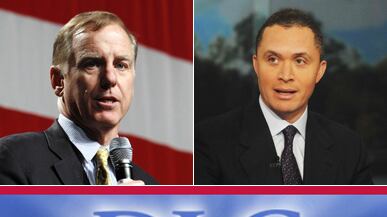When Politico reported Monday afternoon that the Democratic Leadership Council, the centrist advocacy organization that changed the Democratic Party and helped define the Clinton presidency, is shutting down its operations, it represented the culmination of two major shifts in American politics: the Democrats’ move to the center and the intensification of party discipline.

The DLC was founded in the wake of Walter Mondale’s landslide loss to Ronald Reagan in the 1984 presidential election, and it saw as its mission to encourage rising Democratic stars to repudiate the party’s entrenched left-leaning interests. With Bill Clinton’s election, the DLC could claim partial credit for his presidency and achievements like welfare reform. But the victory that outlasted Clinton’s presidency was the normalization of a hawkish, pro-business posture among Democrats. "The most enduring victory the DLC won was fundamentally changing the nature of Democratic politics," says Matt Bennett, co-founder of Third Way, a newer, more conciliatory, but like-minded group. "The party looks nothing like it did when they came along in the mid-1980s, when it was completely in the thrall of special-interest groups."
Some pundits are arguing that the DLC was a victim of its own success at remaking the Democratic Party. "The DLC disappeared because its work was over," wrote Jonathan Chait of The New Republic, a magazine which sometimes served as the journalistic center-left counterpart to the DLC. There is some truth to that: Bill Clinton, who was closely associated with the DLC, tried to assuage the concerns of white voters and the business community: He confronted Jesse Jackson’s Rainbow Coalition and he signed free-trade agreements, a balanced budget, major anti-crime legislation, and welfare reform. By the last decade, the traditional Republican advantages on crime, fiscal discipline and national security had been mostly erased, and business gave generously to Barack Obama’s 2008 campaign. Many DLC principles that were controversial within the Democratic Party are now standard platitudes for any serious Democratic presidential aspirant: Support for deficit reduction, strong defense, free trade, and standing up to the party’s own powerful interests, like public school teachers, when necessary.
Obama’s inner circle has been filled with like-minded moderates such as Chiefs of Staff Rahm Emanuel and Bill Daley, and Joe Biden’s new chief of staff, Bruce Reed, came from the top job at the DLC itself. "The circumstances of the 1980s and 1990s were very different, it was a period in which redefining the Democratic Party was essential to being a majority party," says Bill Galston, a former Clinton adviser who worked with the DLC in its heyday. "The Bush years put more of a premium on what Democrats had in common than what divided them. Some of the redefinition had already happened."
But the story of the DLC’s demise is more complicated than just saying their work was finished, and it says a lot more about current politics than that Democrats have moved to the center.
When Howard Dean, whom the DLC despised, declared to roaring applause that he was going to represent “the Democratic wing of the Democratic Party,” he set himself up in opposition to the era of Democratic defensiveness.
Democrats today are embattled—criticized for being unfriendly to business and blamed by much of the country for ballooning deficits and controversial new government programs such as health-care reform—and suffered a massive defeat in the midterms, largely at the hands of those older white voters. So in some ways this would seem like the DLC’s moment. But whereas in the 1990s ambitious young Democrats like Clinton and Al Gore were eager to associate with the DLC, they have remained stuck on the sidelines as the Democrats struggled. The reason? Changes to our politics and the demographics beneath them.
The 2010 election, like all midterms, featured much lower turnout than a presidential election, and thus an electorate that skews toward the most regular voters: older, whiter, and wealthier than the population as a whole. But look at the electorate that came to the polls in 2008 and you see the future: a generation with unprecedented diversity and liberal views on issues like gay rights and immigration to go with it. Their formative experience is the debacle of the Iraq War and their bread-and-butter concerns—the cost of college and health care—favor Democrats. These changes have not gone unnoticed in the think tanks and magazines that inform official Washington. As books like The Emerging Democratic Majority and Whistling Past Dixie predicted, and Obama proved, the Democrats can win national elections without winning back rural or working-class older white voters if they do well enough and raise turnout enough among educated voters, single women, non-whites and younger voters.
New institutions have arisen online to cater to this new demographic, from MoveOn.org to pugnacious blogs like Daily Kos and Atrios. Liberal blogs have spent much of the last five years criticizing and ridiculing the centrist Beltway establishment, in particular the DLC and its allies such as Joe Lieberman. Kos posted an item celebrating the DLC’s demise as "Another boogeyman dead and buried."
The politics of blog readers is actually fairly moderate. Daily Kos founder Markos Moulitsas calls himself a "liberaltarian" and the blogosphere’s original hero, Howard Dean, is probably closer ideologically to the DLC than he is to Walter Mondale.
But stylistically the DLC could not have been further from the new zeitgeist. Younger Democrats, and the bloggers some of them read, grew up watching a Democratic president impeached on flimsy grounds and a presidential election stolen by a Republican president who mowed down his opposition with the full support of his party in Congress and his cheerleaders at Fox News calling dissenters traitors. What the blogosphere sought was not so much an ideological shift to the left as a tactical shift toward better party discipline and more assertive rhetoric. Joe Lieberman didn’t vote more conservatively than Ben Nelson, but he gave the Republicans sound bites criticizing his party, just like the DLC did.
"Their support for Lieberman [in his 2006 Senate primary], the tone that they took in confronting Howard Dean, and their support for the Iraq War had a huge impact on their relationship with the rest of the progressive movement," says Bennett. "When they came along, they viewed their mission as fighting a battle within the Democratic Party. It was right at that time but it became part of their DNA and it was how they worked during the Bush years." Being so unpopular with the party’s base made the DLC toxic for ambitious Democratic politicians. (In 2003, an obscure Illinois state senator named Barack Obama asked the DLC to take his name off their "New Democrat Directory," saying they listed him without his knowledge.)
When Howard Dean—who the DLC despised—declared to roaring applause that he was going to represent "the Democratic wing of the Democratic Party," he set himself up in opposition to the era of Democratic defensiveness. And while he lost the 2004 primary, he won the war for the party’s soul. In 2005, when Dean became chairman of the Democratic National Committee, the writing was on the wall. The DLC’s political power has disappeared, but its work will go on. Newer groups like Third Way, the Center for American Progress, and the Progressive Policy Institute—a think tank that used to be affiliated with the DLC—while focusing their ire on the right rather than left, continue to generate moderate, market-oriented proposals for Democrats,. And as President Obama’s State of the Union, with its focus on eliminating red tape and fostering innovation, demonstrated, that message is as central to our politics as ever.
Ben Adler is a writer for Newsweek and The Daily Beast covering politics and policy. Ben joined Newsweek in 2009 as national affairs editor of Newsweek.com. He was previously a staff writer at Politico. His writing has also appeared in The Atlantic, Columbia Journalism Review, The Nation, The American Prospect, Next American City and The Washington Monthly and his work has been reprinted in books such as Clued in to Politics and The Contemporary Reader. You can follow Ben on Twitter.




